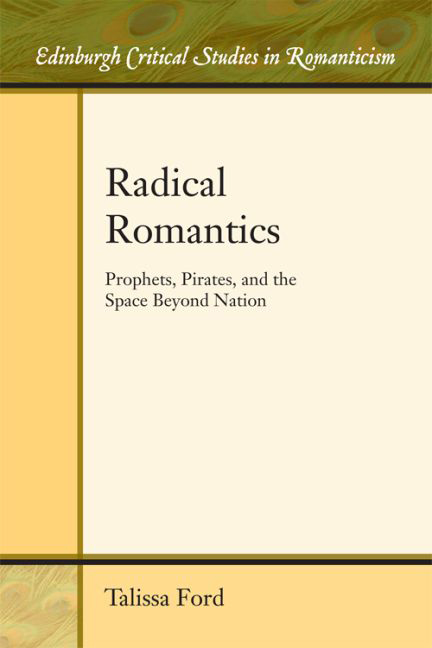Book contents
- Frontmatter
- Contents
- List of Illustrations
- Acknowledgements
- Introduction: Romanticism Off the Map
- 1 It is Not Amiss to Speak of His Beard
- 2 A Pirate or Anything
- 3 Coming Up From the Midst of the Sea
- 4 Jerusalem is Scattered Abroad
- 5 From Here to Timbuktu
- Conclusion: Land Pirates and Republican Ragamuffins
- Index
4 - Jerusalem is Scattered Abroad
Published online by Cambridge University Press: 23 September 2017
- Frontmatter
- Contents
- List of Illustrations
- Acknowledgements
- Introduction: Romanticism Off the Map
- 1 It is Not Amiss to Speak of His Beard
- 2 A Pirate or Anything
- 3 Coming Up From the Midst of the Sea
- 4 Jerusalem is Scattered Abroad
- 5 From Here to Timbuktu
- Conclusion: Land Pirates and Republican Ragamuffins
- Index
Summary
They came up to Jerusalem; they walked before Albion
In the Exchanges of London every Nation walkd
And London walkd in every Nation mutual in love & harmony
Albion coverd the whole Earth, England encompassd the Nations …
From bright Japan & China to Hesperia France & England.
The footsteps of the Lamb of God were there: but now no more …
William Blake, Jerusalem (24: 42–51)Though it is in his preface to Milton that Blake famously calls on his readers to build Jerusalem ‘In Englands green & pleasant Land’, it is Jerusalem that synthesises the national and apocalyptic interests of his earlier prophecies. Blake's ambiguously utopic vision of Albion covering the earth treads a very fine line between eternity and empire: ‘Bright Japan and China’ might just as well be another stop along the Silk Road; the land where the Lamb of God walked is at once the Holy City and London, the Temple and a financial exchange. Jerusalem 's collapse of the real and the imaginary does indeed lead many critics to read it as an unapologetically imperialist poem. Julia Wright, for example, calls it ‘tyrannical’, charging Blake with ‘plotting the assimilation of the globe into his own political and religious vision’. She argues that Jerusalem ‘ envisions a kind of imaginative colonisation … in which Albion's and Jerusalem's prior universality is reinstated over the national and cultural divisions of the present’. Saree Makdisi offers a very different reading of Blake's seeming Anglocentrism, arguing that his Universal Empire, which conflates all other nations and peoples with England, carries within itself the seed of its own destruction; in the process of binding people together, Makdisi suggests, the Universal Empire creates a unified people capable of overthrowing it. Other critics argue against any social content at all; Mark Ferrara writes that Jerusalem 's utopia is ‘stripped of its social dimensions and is instead a meditative, internal, and subjective experience …’
This dizzying range of interpretations is made possible by Blake's removal from direct political engagement; a text like Jerusalem, the subject of which has such a clear referent in the outside world, can be read more or less literally depending on one's understanding of Blake as a political agent.
- Type
- Chapter
- Information
- Radical RomanticsProphets, Pirates, and the Space Beyond Nation, pp. 91 - 122Publisher: Edinburgh University PressPrint publication year: 2016



